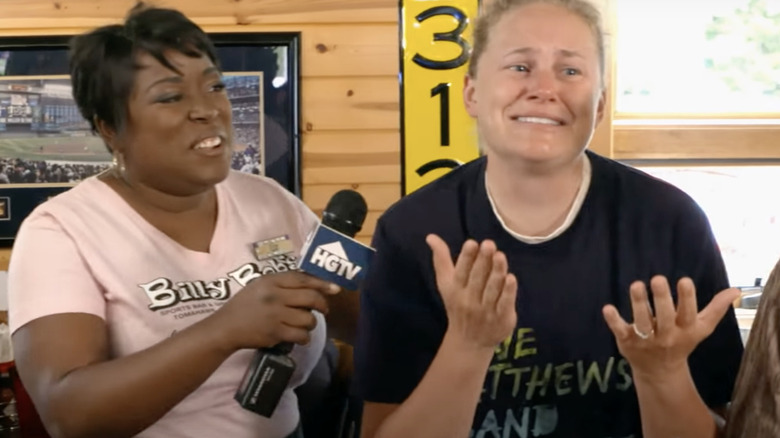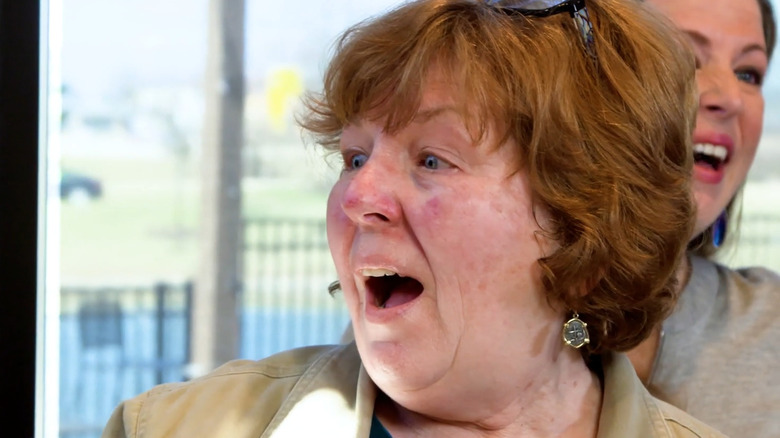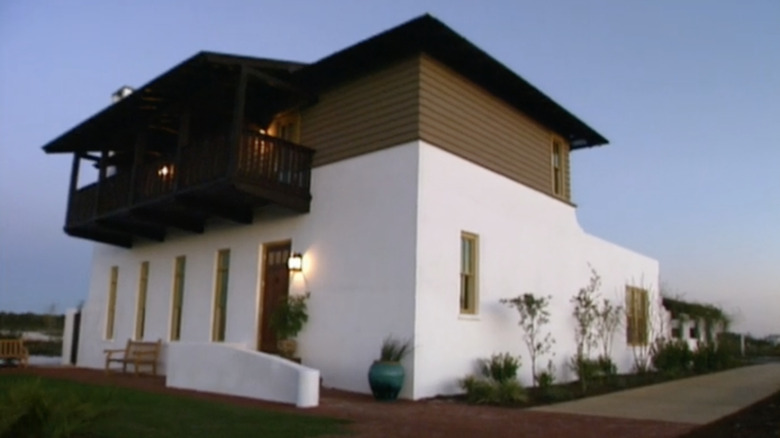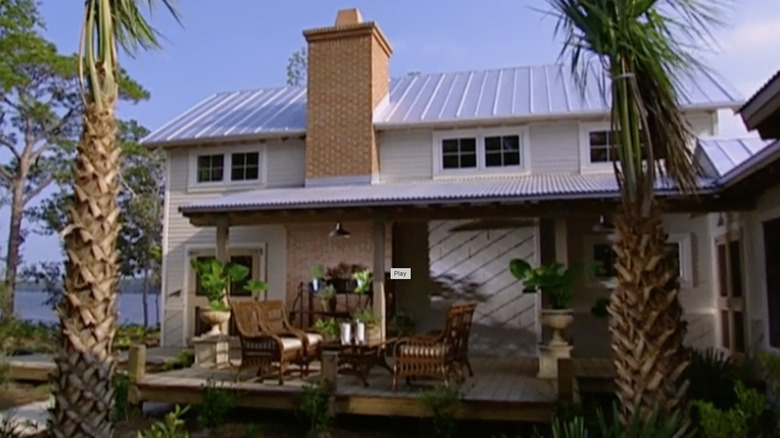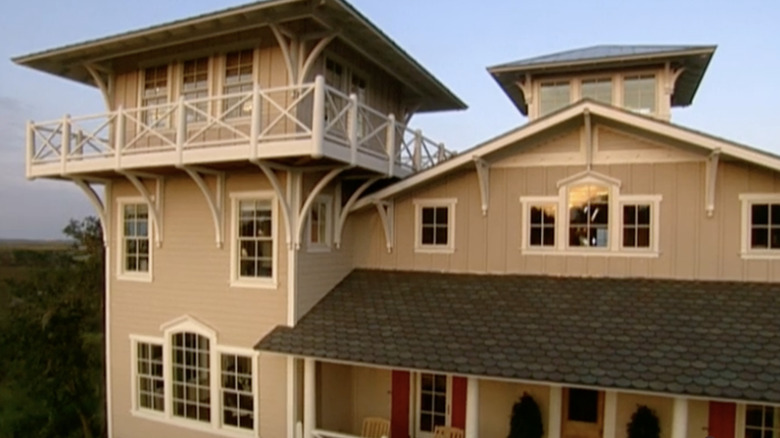HGTV Dream Home Stories That Ended In Tragedy
Winning HGTV's "Dream Home" is a chance to change your life. One lucky contestant a year wins a multimillion-dollar home, and all it takes is entering the contest once or twice a day for a few months. It's one of the easiest ways to become a millionaire without being born into it. And you get far more than a lump sum of money; you get an entirely new lifestyle.
HGTV's top designers customize homes with high-end furnishings, the latest gadgets, and all the luxury upgrades you can imagine. They plan out these properties so the residents can live in opulence. Moving into such a place means spending your afternoons soaking up the sun next to your waterfall and relaxing to the sounds of water babbling in your pond. You can cook lunch in an outdoor kitchen befitting the poolside of a resort, making every day feel like a vacation. There's no doubt winning a home like this is life-changing, but is the change always for the better? When the filming stops, and the winners return to their lives, how many "Dream Home" stories end in tragedy?
Some stories don't get an ending
Beverly Fulkerson watched HGTV since 1998, four years after the network's creation. As an avid fan of "Dream Home," she applied twice daily for years. In 2019, winning was indeed a dream come true for the school teacher from Indiana, but what ever happened to her?
Fulkerson gushed to the network that she never thought she would win when they ambushed her at what she thought was her daughter's award ceremony. She talked about sitting on the porch or relaxing in the hot tub (via HGTV), but that's where the story seems to end. There's a great deal of speculation over whether or not Fulkerson ever enjoyed the view from her porch or a dip in the spa, as it seems someone is renting the property out.
As of publication, the 2019 "Dream Home" is a vacation rental on Rent by Owner. Unfortunately, the site doesn't give any information on who made the listing. But a quick review of the property records shows the house went up for sale in June 2019 and was sold three months later — just long enough for Fulkerson to enjoy the place before selling. Considering the total taxes on just the home that year were $1,722,900; it was probably the right move for the preschool teacher. And hopefully, her time there fulfilled the decades-long fantasy. CNBC Make It reported that Fulkerson requested no further interviews after the show.
Emily Muniz dreamed of the Pacific Northwest, but that dream couldn't become her reality
Emily Muniz saw HGTV's 2018 "Dream Home" in the Washington area and fantasized about it since her honeymoon. So, she and her husband dedicated themselves to entering the competition as often as permissible. The show offered a chance to turn their dream destination into a reality. The opportunity might have seemed kismet at the time, but winning was another story.
Muniz was an executive producer of a television show, a job offering her more financial stability for the hefty price tag that comes with winning a dream home than most contestants on the show. And while she discussed their decision with a financial advisor, there was more to consider than the expenses the property posed. Ultimately there were too many sacrifices required to live out the dream.
The Munizs didn't want to tear their daughter from school or leave their successful careers behind. Muniz described the experience of winning as surreal (via People), and that's precisely what the home ended up being for the family — a fantasy that couldn't quite become a reality.
Belinda Brown tried to rent the property but couldn't escape the tax burden
Belinda Brown was the third contestant to win HGTV's "Dream Home" in 1999. This meant she didn't have years of stories to consider when deciding between the property or the cash prize. Michele Rambo — the first "Dream Home" winner in 1997 — didn't discuss her experience much with the press then or anytime after her episode aired, leaving Brown with little to go off. And since Tina Carlson — the 1998 winner — kept the home, seemingly without issue, there was no way for Brown to know that most winners wouldn't take the HGTV "Dream Home."
Brown decided to follow Carlson's lead and keep the property. Presumably, Brown read all about the hefty tax burdens when she signed up for the show and was aware that the free house came with a big price tag from the IRS. But she must have thought the profits from renting out a "Dream Home" would cover the costs because she turned the place into a rental property after keeping it. Sadly, two years later, Brown was $300,000 in debt due to taxes, and the dream was turning more to tragedy than fantasy, so she gave it up. "There's just no way, unless you're independently wealthy, that you can keep something like that," Brown said (via My Plainview).
The show makes sure not to hide its tax burden from contestants and focuses an entire section of its FAQ page on the possible expenses.
Don Cruz uprooted his family just to go into foreclosure
Don Cruz had big dreams for his dream house. In 2005, he saw more than a place for him and his family to live; he saw an opportunity. The boathouse and the extra rooms on the property were the perfect way for him and his family to cover the costs of living in their new home. A welcoming mix of lavish finishings and creature comforts would offer potential guests a grand escape at their bed and breakfast.
Everything might have worked out if he'd won a decade later when turning residential properties into vacation rentals became far more commonplace. The problem wasn't a lack of appeal from guests. Cruz offered frequent tours of the home to fans despite never having any guests stay at his inn (via Liveabout Dotcom). Sadly the bed and breakfast never opened due to zoning requirements, and the city made it impossible for Cruz to turn his dream home into a vacation destination.
Still, he wasn't deterred. Instead, he stayed at the home with his family, connecting with the locals and taking advantage of the experience. When his dad was diagnosed with cancer, he took out a mortgage on the house to cover medical expenses, and in 2008, the bank foreclosed on the property. It wasn't the ending he dreamed of, but Cruz believed the win was worth the losses and recommended future contestants to live it up while it lasts.
John Groszkiewicz sold his dream home and still ended up audited by the IRS
In 2003, the Groszkiewicz family listened to HGTV executives explain that the dream home isn't about living on the property; it's about the opportunities that the property offers. "They told us the dream's not so much the house. The dream is what happens after you sell the house," Groszkiewicz said (via the Pittsburgh Post-Gazette). So Groszkiewicz visited the property a few times, got incredible vacations out of the experience, then decided to sell.
The Groszkiewicz family's newfound wealth had a rocky beginning despite the family quickly finding someone to take the property off their hands. After selling the house, the IRS audited them not once but twice. As if filing taxes isn't hard enough, going through an audit is a long and arduous process of reviewing all of your files, receipts, and financial records and handing them over for an IRS agent to verify. When the family finished the first audit, they received a late Christmas present on the 26th of December, a letter announcing their second audit. Fortunately, it came at the same time as a letter explaining their total balance due was less than a quarter. While everything worked out for the family after their time on "Dream Home," sadly, their story's happily ever after met its ending when John Groszkiewicz passed away 14 years later.
Tina Carlson held on to her home longer than any other winner and still lost it
Tina Carlson is known as the "Dream Home" winner to hold on to the property longer than any contestant on the show, but she never actually got to live in the house. To cover the outrageous expenses that a dream property incurs, Carlson rented it out for seven years. She ended up borrowing against the value of the fantasy home to pay the taxes and then paid the mortgage by renting to friends and acquaintances (via The Wall Street Journal).
Income property sounds like a profitable game plan but the truth of income property is more complex than a lot of people realize. It comes with its own set of taxes and expenses and eats away at the profits the passive income provides.
For Carlson, there was more than just the taxes from winning the house. As the owner of the 1998 "Dream Home," Carlson would have also incurred annual property and income taxes associated with owning and renting the home. When renting a property, there are also all the complications of being a landlord — maintaining the property, paying for repairs, etc. It's unclear if Carlson vacationed at her Florida retreat or if the cost of the mortgage she took out to cover the tax burden was too much for her even to enjoy a weekend there. But after seven years of trying to make it work, she decided it was just too much.
Laura Martin was ready to move her whole family until she saw the tax bill
In 2014, Laura Martin was so shocked when the camera crew showed up to announce her victory that she famously said she almost peed her pants (via The Newport Daily News). Her entire family was thrilled for the opportunity to live out their fantasy in the Lake Tahoe dream property. After peering inside the stunning home, there's no wonder either.
Lake Tahoe is within 500 miles of Boise, Idaho, where the family lived, and the mountain town culture would have made an easy transition for them. But Martin couldn't afford the tax bill that accompanied the house. "I was completely ready to pack up and move to Tahoe to live in the house but Uncle Sam decides that he wants his tax cut and that was too cost prohibitive to retain the home," Marting explained (via The Newport Daily News). The good news is the story wasn't all tragedy.
Every year, winners of HGTV's "Dream Home" are offered a brand new, fully-furnished home along with a new car and $100,000. If the winner prefers to opt out of the prize package, they can take the cash option — which, for reference, was $750,000 in 2023, according to HGTV's sweepstake rules. So, the Martin family took the cash prize and passed on the house. And with the money they won, they could afford to buy their dream home in Boise that didn't come with such a hefty tax bill.
Even when everything seems to align, something goes awry
Susan O'Gorman is one of the only contestants to win a property near her current home. While contestants always know where the winning house will be, they often report not believing they would ever win one of the properties. In fantasy mode, logistics like moving across the country are less concerning than what it would be like to relax in a jetted tub while staring out a wall of windows into the enchanted forest that is your property. So when contestants get the news, they're usually faced with a cross-country move.
The O'Gormans didn't have that problem. Their potential new home near Hilton Head in South Carolina was only three hours from where they resided in Perry, Georgia — too far to commute every day, but the perfect distance for a weekend getaway. Making the place all the more a dream, O'Gorman was also very familiar with her new neighborhood. "We used to vacation there when the kids were young, it's one of our favorite places to be," she said (via The Atlanta Journal-Constitution).
While the O'Gormans kept the 2020 "Dream Home," they soon found the property too much to handle. Luckily for them, houses were selling fast that year, allowing them to release that burden in just three weeks. So, while those long past family vacations remained a memory, the O'Gormans seemed to find solace in the $1,600,000 the property earned them.
Kathi Nakao couldn't keep the house after going $400,000 into debt
Kathi Nakao was retired with her husband when she won her "Dream Home" property in 2004. It should've been the beginning of the picture-perfect final chapters in their lives, a time when they could enjoy the lavish furnishings and amenities of the home while exploring new destinations. When it comes to retirement plans, winning HGTV's "Dream Home" giveaway was her chance to live out her days in a fantasy.
Sadly for Nakao, she didn't get those years of happily ever after. Instead, she found herself in significant debt over the property despite almost 30 years working in accounting for the California government. While you win the place without cost, the U.S. levies hefty taxes on gifts. And the 3,500 square foot home's value was worth a second house in taxes. "Ordinary people cannot keep a home like that," Nakao said (via The Washington Post).
At least Nakao and her husband got the most out of the property while they had it, taking extended vacations before they sold it. The couple reported owing $400,000 to the IRS and decided to sell before going further into debt. Fortunately, the house sold quickly, and they could pay off the IRS before getting hit with any repercussions.
David Rennie's college buddy ruined the big reveal for HGTV
A lot of "Dream Home" stories highlight the struggles that contestants experience after winning the fantasy property. But for David Rennie, the real tragedy happened before HGTV revealed his name as the winner in 2016. His college friend announced Rennie's victory on Facebook before the network aired the episode, causing other contestants and potential winners to learn that their name wasn't pulled from the draw way before the show intended. It's unclear if their friendship drifted apart or if Rennie laughed off the leaked news.
Luckily for Rennie, the mishaps ended there. He decided to accept the cash offer over risking calamities with the house. Florida Today reported that Rennie received $1,200,000 which was less than the house's expected value of $1,700,000; however, it also was a lot easier to accept. While winners can mortgage the house to cover the one-time gift tax, they still must consider the annual property tax and maintenance expenses. Remember, a drool-worthy garden means lots of personal dedication or spending your money on a gardener.
